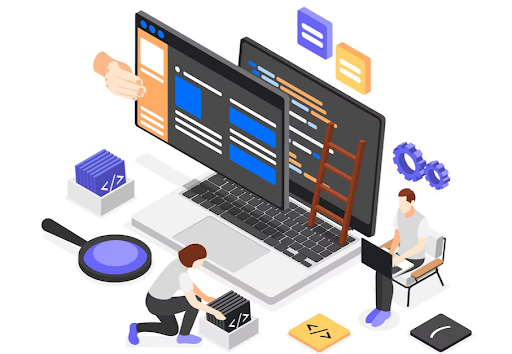Scala vs. Java: Why Businesses are Choosing Scala Developers in 2025
- Chetan Chaand
- May 22, 2025
- 5 Minute Read

Scala and Java are both powerful, JVM-based programming languages widely used for enterprise and backend development. While Java has long been the industry standard, Scala is emerging as a preferred choice for high-performance, scalable applications.
In 2025, the comparison between these two languages is more relevant than ever. As software demands grow complex, businesses seek modern, efficient solutions. This shift has fueled the growing demand for Scala developers across sectors.
This blog explores why hiring Scala developers in 2025 is becoming a strategic move for forward-thinking companies.
Language Comparison: Scala vs Java
Understanding the trade-offs between Scala and Java is essential when hiring developers for modern, scalable systems. Though both run on the JVM, their design philosophies, syntax, and ecosystem compatibility vary significantly.
1. Performance and Efficiency
Both Scala and Java compile to bytecode and run efficiently on the JVM. Java offers faster compilation times and slightly lower memory overhead. However, Scala can deliver equal or better runtime performance, particularly in concurrent applications when designed well.
2. Syntax and Developer Productivity
Scala offers concise, expressive syntax that eliminates boilerplate through type inference, pattern matching, and immutability. This increases developer productivity and reduces errors. Java remains more verbose and requires manual constructs for similar functionality.
While recent Java versions added functional features, they are less native compared to Scala’s integrated paradigm. This makes Scala better for teams building modern, scalable backend systems.
3. Functional Programming Capabilities
Scala was built with functional programming at its core. It supports pure functions, immutability, and higher-order functions, leading to more modular and predictable code. Java, though adding lambdas and streams, still lacks full FP integration.
For concurrent or data-heavy systems, Scala enables cleaner logic and easier debugging, making it a preferred choice for building reactive, fault-tolerant applications.
4. Ecosystem and Tooling
Java has a mature ecosystem supported by many libraries and frameworks, tested by the community. On the other hand, Scala has a more modern ecosystem with acclaim in the data engineering world, particularly with tools including Akka, Spark, and Kafka.
While Java uses Maven or Gradle, Scala often utilizes sbt, which is more suited to functional workflows.
5. Community and Developer Support
Java has the largest developer community all over the world, providing rich documentation, and it is easy to hire a specialist for. Scala is more complex to learn, and there is a smaller talent pool, but the language is growing quickly. In 2025, you should hire Scala developers given their high demand for big data and AI-driven applications.
Why Businesses Are Choosing Scala Developers in 2025
In 2025, businesses will increasingly prioritize speed, concurrency, and scalability in their digital infrastructure. Scala has emerged as a preferred language due to its strong capabilities in building performant and data-intensive systems.
In fact, more than 60% of startups in AI and data science prefer Scala for machine learning projects, citing enhanced performance in handling large data sets.
1. Demand for Scalability and Concurrency
Scala supports highly concurrent architectures through functional programming constructs and libraries like Akka. It is well-suited for real-time systems and streaming platforms that demand responsiveness under high load. Its native compatibility with microservices architecture also allows faster deployment cycles and modular scalability.
2. Scala’s Role in Data Engineering and AI
Scala is widely used in big data due to its native support for Apache Spark. Its functional style suits data transformation tasks, while its compatibility with Kafka supports real-time processing. Java is more verbose and less efficient in these use cases.
For AI pipelines and scalable ETL jobs, Scala delivers better performance, readability, and concurrency, which makes it ideal for data-centric engineering roles.
3. Hiring Trends and Scala Developer Skills
There is a noticeable surge in demand for Scala developers in 2025. Companies seek Scala developers with specialized expertise, especially for backend and data-heavy roles.
While Java generalists still dominate the broader market, many teams are investing in upskilling initiatives to transition existing Java developers to Scala for greater long-term productivity.

Challenges of Adopting Scala
While Scala brings strong advantages in functional programming and scalability, it also introduces a few barriers that businesses should prepare for:
- Steeper Learning Curve: Scala’s hybrid nature, combining object-oriented and functional programming, makes it powerful but complex. Developers coming from strictly object-oriented backgrounds often need extensive training before becoming productive.
- Limited Talent Pool: Despite growing interest, the number of experienced Scala developers remains relatively low compared to Java. This scarcity increases hiring difficulty and can drive up salary expectations.
- Migration Complexity and Cost: Transitioning from an existing Java ecosystem to Scala requires careful planning. It often involves rewriting modules, updating dependencies, and reconfiguring build tools. These efforts can increase both time and financial costs, especially for larger codebases.
Java’s Continued Relevance
Despite growing enthusiasm for Scala, Java continues to hold firm in enterprise development, especially for large-scale and regulated systems:
- Enterprise-Grade Stability: Java’s maturity makes it the go-to language for industries like finance, healthcare, and government. Its robust libraries, community support, and backward compatibility ensure long-term stability.
- Lower Hiring Barriers: With millions of developers familiar with Java, companies find it easier to scale teams and onboard new talent. The cost and time required to recruit and train Java developers are significantly lower than with Scala.
- Best for Certain Use Cases: Java remains the better choice for specific use cases when projects need high reliability, have a low learning curve, and proven performance in monolithic or legacy environments. It’s also great for organizations with existing DevOps pipelines built around the Java ecosystem.

Future Outlook: Java and Scala in the Next 5 Years
The future of backend development is expected to evolve rapidly, with both Java and Scala playing distinct roles. Experts predict Scala will continue gaining ground in data engineering, AI, and distributed systems due to its compatibility with Apache Spark and functional capabilities.
Java, meanwhile, will remain a stronghold in enterprise and financial software. While convergence in tooling may occur, the developer communities and architectural use cases are expected to diverge further.
Businesses will likely embrace polyglot programming, using both languages where they fit best across microservices and cloud-native architectures.
Summary
In 2025, the debate between Java and Scala is no longer just about syntax; it is about business outcomes. While Java offers unmatched reliability and a vast developer pool, Scala provides a modern approach to building scalable, data-intensive applications.
Understanding your project’s needs, team capabilities, and future scalability is key to making the right hiring decision. Whether you are modernizing a legacy platform or building real-time data pipelines, hiring Scala developers in 2025 could be the competitive edge your business needs.
Frequently Asked Questions
What is the main difference between Scala and Java?
Ans: Scala blends functional and object-oriented programming, offering concise syntax and better support for concurrency. Java focuses on object-oriented programming and long-term stability.
Why are companies switching from Java to Scala developers?
Ans: Companies prioritize Scala for its concise code, seamless Spark integration, and suitability for real-time, concurrent applications.
How is Scala used in big data and machine learning?
Ans: Scala powers big data frameworks like Apache Spark and is often used for building ETL pipelines and AI training workflows.
Which companies are hiring Scala developers in 2025?
Ans: Top tech firms, fintech startups, and AI-focused enterprises like Twitter, LinkedIn, and Databricks continue hiring Scala developers at scale.






